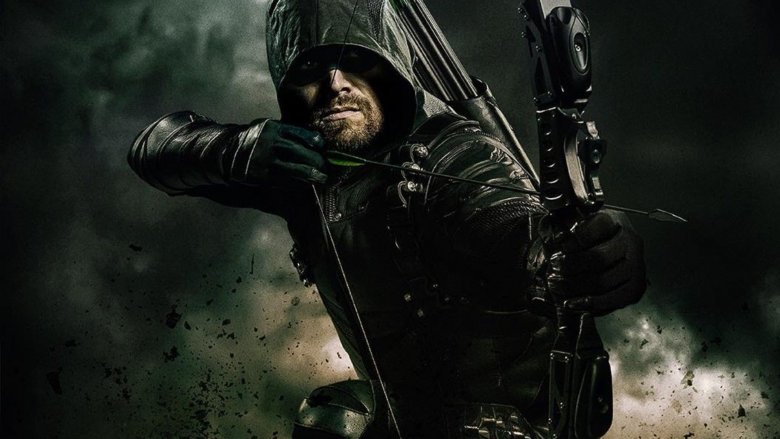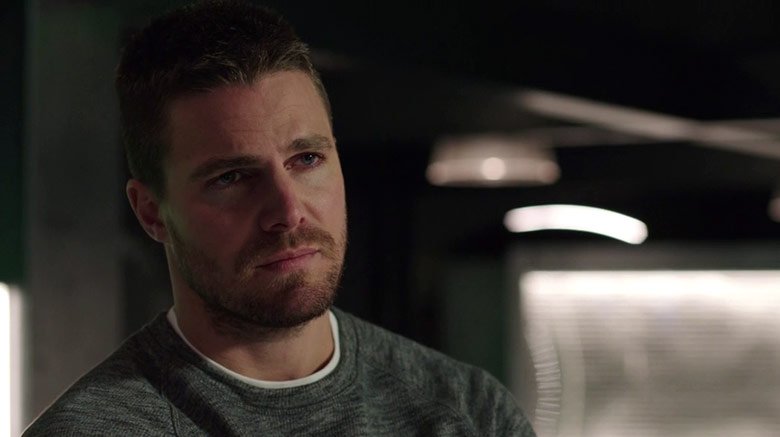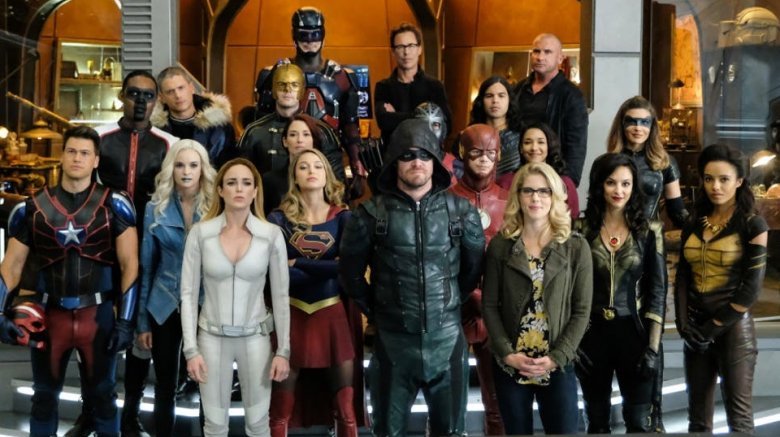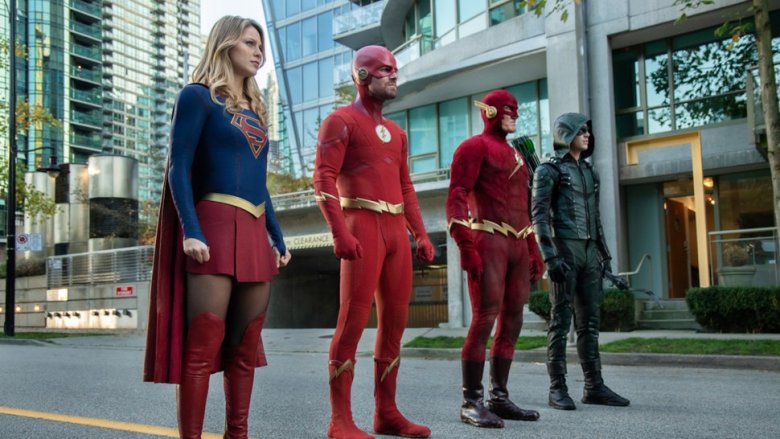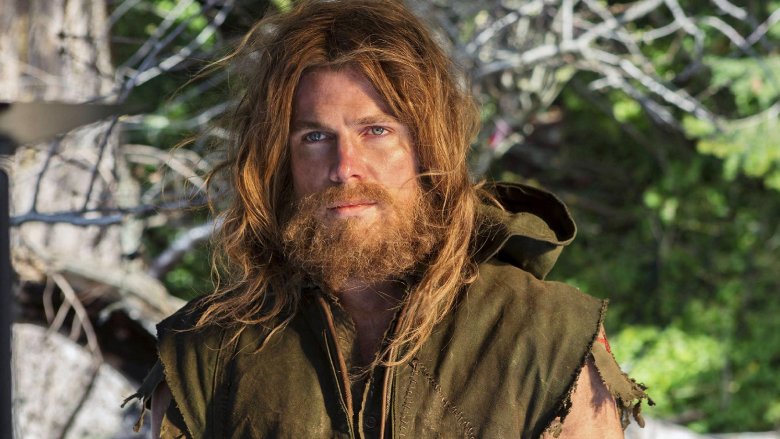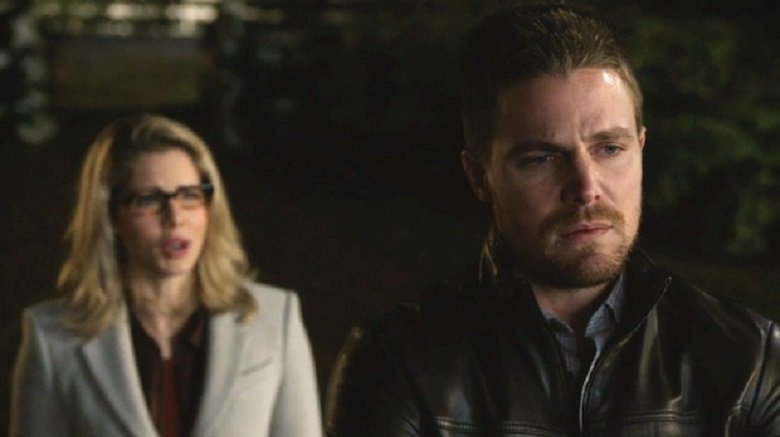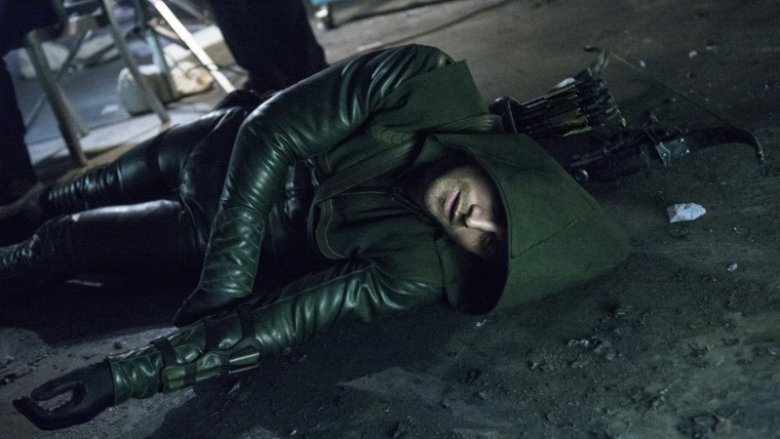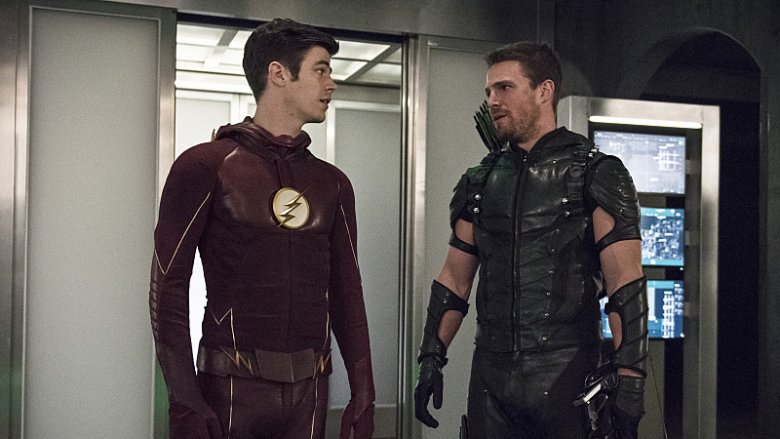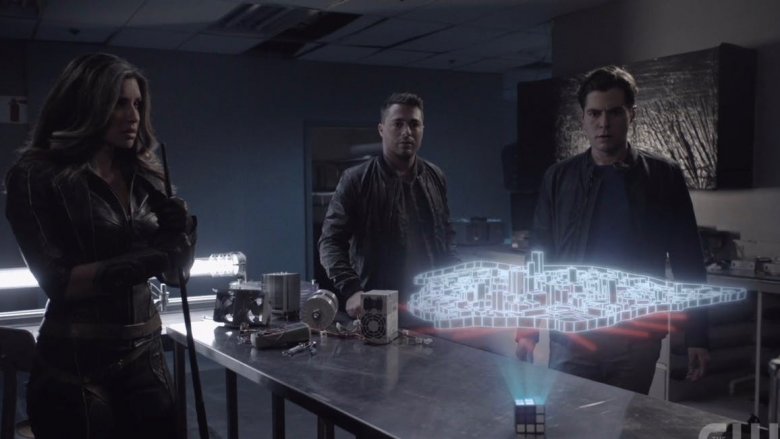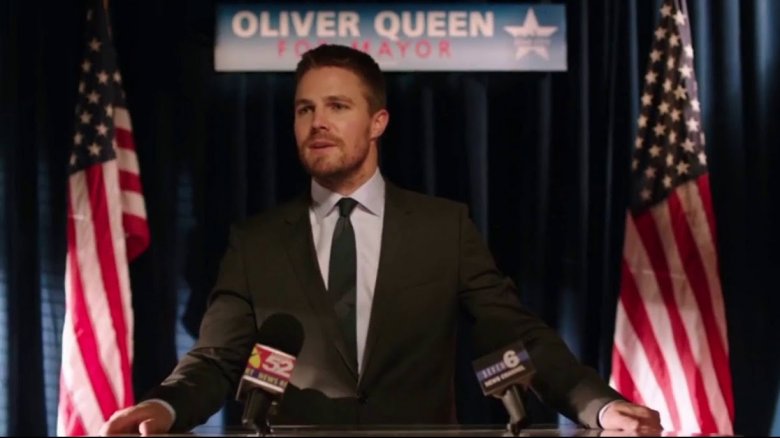The Truth About Why Arrow Is Ending
Soon the Arrowverse will be missing its namesake. Early in March 2019, Arrow executive producers announced the series would wrap with its eighth season, and that season would consist of only 10 episodes.
Arrow premiered on CW in October 2012, following the attempts of Oliver Queen (Stephen Amell) to redeem his father's legacy and to save what was originally called Starling City. While it was clear Amell's character was based on the superhero Green Arrow of DC Comics, initially he was known to Starling City residents only as "The Hood." He also used more lethal methods in the early days of the series, even murdering a man in the first episode to protect his secret identity. Over the course of seven years the show grew more reflective of the comics, with the name of Queen's hometown changing to Star City and Queen embracing the comic book title of Green Arrow.
Arrow soon spawned other CW/DC Comics shows including The Flash and Legends of Tomorrow, giving birth to what is now generally called the "Arrowverse." Supergirl soon came along, and Batwoman is set to join the Arrowverse in fall 2019. While not officially a part of the Arrowverse, CW's Black Lightning brought another DC hero to the small screen in early 2018.
With Arrow not only succeeding but multiplying that success with an increasing number of connected series, why would anyone want it to end? Here's the truth about why Arrow is ending.
Shrinking viewership
When you hear a TV series has been cut, the first understandable assumption is that ratings are to blame. In the case of Arrow's cancellation, ratings seem to play a role but they probably weren't the definitive factor.
Arrow's ratings dropped for a few years and in 2017 the show was shifted to Thursday nights where it was hoped the emerald crimefighter would get some castoffs from Supernatural's superior ratings. Unfortunately, like all of CW's Arrowverse shows at the time, Arrow still suffered a 14 percent ratings decline, despite coming on right after the popular exploits of the Winchester brothers. Viewers dropped off again in 2018, at which point the question on most fans' minds may have been why it wasn't already canceled.
A couple days after the announcement that Arrow would end, ScreenRant reported that while the show continued to lose viewers in 2019, things weren't bleak enough for ratings alone to put Arrow on the chopping block. In fact, the site reported that statistics they received from the data analytics firm Parrot Analytics showed Arrow as the second most successful of CW's four Arrowverse series at the time of its cancellation, coming behind The Flash. So while Arrow's dropping numbers may have contributed to its end, you would assume that Supergirl and Legends of Tomorrow would also be cut if low ratings were the biggest factor.
Too many heroes
The term "superhero fatigue" has been thrown around for a few years now, with people understandably wondering — considering the growing amount of media about them — exactly when the public is going to grow tired of superheroes. Some people are fervently hoping for it. But so far people keeping paying for tickets to see Jason Momoa underwater and Brie Larson in space, so the super-people of fiction probably aren't real worried just yet.
However, Arrow may be the victim of a very specific type of superhero fatigue: CW superhero fatigue. Arrow shares a narrative with The Flash, Supergirl, and Legends of Tomorrow. While it's not a part of the Arrowverse, CW has Black Lightning, it will soon air Batwoman, and there continue to be rumblings about Superman getting his own CW entry.
The CW's Arrowverse was already a crowded place, and it's getting more crowded every year. One of the factors of the decision to end Arrow may be that there simply isn't enough room for it. The timing of the cancellation makes it seem more likely considering the coming of Batwoman. Of all the Arrowverse series, Arrow has usually been the grittier of the bunch. With Batwoman featuring a Batman spinoff in Gotham City, it may need to claim the title of the grittiest Arrowverse show in order to thrive.
Crisis
One of the reasons Arrow could be ending is because it's a perfect time to do it.
Starting with 2014's "Flash vs. Arrow," the Arrowverse is known for its annual crossover events across two or more series. "Elseworlds" was the name for 2018's Arrowverse crossover, cutting across Supergirl, Arrow, and The Flash. LaMonica Garrett played one of the story's adversaries — a seemingly godlike being called The Monitor who said he was preparing Earth-1 for something cataclysmic. For the first time, CW ended its crossover with a tease for the following year's event, confirming that the 2019 Arrowverse crossover will be called "Crisis On Infinite Earths."
You could say that 1985's Crisis On Infinite Earths was the crossover. The DC Comics line-wide event changed the company's entire fictional landscape, bringing some disparate narratives together and completely wiping out others. The event was also noteworthy for some prominent character deaths, which is where Arrow may come in.
Arrow's eighth and final season will be an abbreviated one: 10 episodes. So the final episode of Arrow will air roughly around the same time as its 2018 "Elseworlds" episode; Arrow's "Elseworlds, Part 2" was the seventh season's ninth episode. Considering the timing, it seems like a good bet that whatever narrative choices are made to wrap up the story of Oliver Queen — including, possibly, giving him a heroic death — they'll have a whole lot to do with the events of "Crisis."
Repetition and redundancy and also repetition
If you're asking why Arrow is ending, it really might be helpful to ask why it's even lasted this long.
Oliver Queen has walked over the same ground again and again, literally and figuratively. We've not only seen hours and hours of flashbacks to the Island of Lian Yu where he was "stranded" (but managed to leave and travel to, like, three different continents only to come back again and pretend he never left at all), we've seen Queen and his Team Arrow buddies go back to the island in the present so often that it's a little confusing why they don't just build a summer home there with air shuttle service. We've seen Oliver and his comrades suffer physical and/or mental trauma and be miraculously healed, we've seen them die and come back, and we've seen them all say yes and subsequently no and shortly afterward yes and once more no to the question of whether or not they want to dress funny and dropkick criminals, too.
But worse than the repetitive plot points is the ongoing, unconvincing struggle with Queen's "darker" self which just won't let him be good, except that it totally does all the time. To believe Oliver Queen's inner struggle, he is both Hannibal Lecter and the only person who can solve the world's problems or make any kind of meaningful decisions. It's a dead horse that needs the creative team of Arrow to finally keep their hands to themselves.
Moving on
According to Stephen Amell, the biggest determining factor in the decision to end Arrow was Green Arrow himself.
Shortly after the announcement that Arrow's eighth season would be its last, Amell posted a Facebook video to let fans know what had happened. He told them that he'd approached producer Greg Berlanti at the end of Arrow's sixth season, expressing his wish for season seven to be its last. Amell said he'd, "always been a fan of television shows that not only don't overstay their welcome, but end in a manner that really packs a punch."
Fittingly, considering his character has grown to be much more of a family man over the years — Oliver Queen is married, has a son and a second child on the way — Amell told viewers that the changes in his life behind the camera greatly informed his desire for Arrow to conclude, saying that, "a large part of this decision [is] because I'm now a father and a husband, [and] to say that it has been a real sea change over the past seven-plus years would be a vast understatement."
If there's any doubt about what Arrow has meant to Amell, watching the video should cure it. Amell is clearly emotional, needing to stop a number of times to collect himself.
Physical demands
Arrow is clearly a physically demanding show. Most episodes feature at least a couple of complex fight sequences that include a healthy chunk of the cast, not to mention the perfectly nonviolent training scenes or the shots of Amell doing those salmon ladder pull-ups that make Felicity drool all the time. In such a physical show, accidents will and do happen. Thankfully it seems they usually aren't too serious, like Kate Cassidy belly flopping while trying to throw a punch.
But the heroes of Star City aren't getting any younger. Rick Gonzalez, who plays the hockey-mask-sporting Mad Dog, turns 40 this year and Amell is only a couple years behind him. David Ramsey, who plays Queen's stalwart ally John Diggle, aka Spartan, is inching close to 50.
For context, consider that 27-year-old Colton Haynes — who played sidekick Roy Harper, aka Arsenal — left Arrow when he was a series regular because of the physical and emotional demands. Having wrestled with anxiety issues for his "entire life," Colton Haynes told Entertainment Tonight that he left Arrow for the sake of his "physical and mental health." Haynes told EW before leaving the show he was "physically ill, fainting. ... I had to step back."
Odd man out
Arrow's position in the Arrowverse is a little awkward. When the only shows in CW's Arrowverse were Arrow and The Flash, the grittier Arrow contrasted sharply against the bright, superheroic optimism of The Flash. Arrow was rooted in a more real world. Sure, referring to bow-and-arrow-wielding ninja billionaires like Malcolm Merlyn (John Barrowman) as more "real" may seem laughable. But compared to the time-and-space-hopping heroes of Legends of Tomorrow, the alien champion from Supergirl, or the ridiculous ease with which multiple characters on The Flash can time travel by just running really fast, ninjas are as "real world" as the guys who pick up your garbage every week.
The problem is that as the Arrowverse expanded, rather than acting as a darker contrast to the other shows, Arrow was forced to be a little more "super." The list of perfectly mundane criminals Oliver Queen wanted to stop went away, and his rogues gallery filled up with metahumans like Deathstroke (Manu Bennett) and demon-worshiping wizards like Damien Darhk (Neal McDonough). Almost everyone in Arrow's cast got domino masks and code names, but the show never strayed too far from its roots. It wanted to be super enough to exist in the same world as Central City speedsters and flying Kryptonians, but not so super that crime bosses and drug dealers couldn't still be viable threats. The result was a show that didn't know what it wanted to be.
Future imperfect
As early as its first season, one of the hallmarks of Arrow was its flashbacks. The series begins at the end of Oliver Queen's supposed five-year stay on the remote island of Lian Yu (though we eventually learn he was a lot more mobile), and most of Arrow's episodes go back-and-forth between the present and Queen's struggles in the past.
Arrow switched things up in the beginning of Season 7. Rather than featuring occasional flashbacks, Arrow's Season 7 premiere ended with a flash-forward set 20 years in the future with Oliver Queen's grown son William (Ben Lewis) meeting an older Roy Harper (Colton Haynes) on Lian Yu. Over the course of the season, a story unfolds in the flash-forwards to a time when "vigilante" has become a very dirty word and the grown children of Oliver, Felicity, and Diggle fight to stop a plot to destroy Star City.
By going forward, Arrow painted itself into a corner. Unless we get some kind of time-traveling salvation (in which case any fan could rightly ask why they had to sit through the flash-forwards in the first place), everyone watching Arrow knows how the future looks for its characters, and it's not good. As Laura Hurley wrote for CinemaBlend, the flash-forwards potentially took away any reason to keep watching. They have, Hurley writes, "given us no reason to hope for anything less than something slightly less awful than the current status quo."
No other roads
Regardless of ratings or the shifting priorities of Arrow's talent, it's more than reasonable to ask what's left to do in the story of Oliver Queen if Arrow were to continue. The trajectory of Oliver Queen's life over the past seven seasons has been pretty ridiculous. He's been a vigilante, a brutal government interrogator, a made-man in the Russian mafia, and the successor for the leadership of the League of Shadows. He's been the mayor, he's been unmasked, he's died, he's been The Flash, he's been Star City's most famous convicted felon, and he's currently a mask-less employee of the Star City Police Department. Because when you get pulled over in Star City, you're going to get more than a ticket. You're going to get a nice big laugh at the expense of the guy in the green tights who pulled you over — "You were going 65 in a 35. YOU HAVE FAILED THIS CITY!"
Eventually — as it seems Amell realizes — you have to stop giving Oliver Queen more jobs than Barbie and just end the narrative already. Whether you love it, hate it, or anywhere in between, Arrow has left a huge footprint on the television landscape. It's helped piss off Bill Maher by filling the airwaves with live-action superheroes. It's done its job. Oliver can retire with Felicity so they can grow old together, happily, with Oliver doing salmon ladder pull-ups for his blushing bride well into their golden years.
